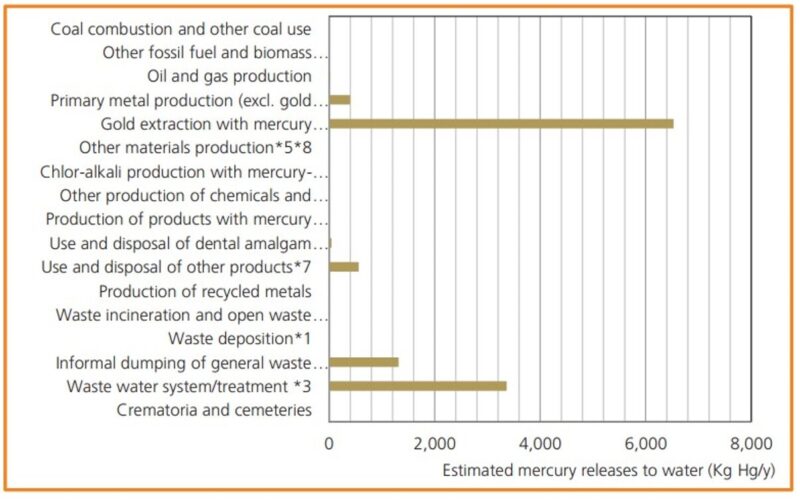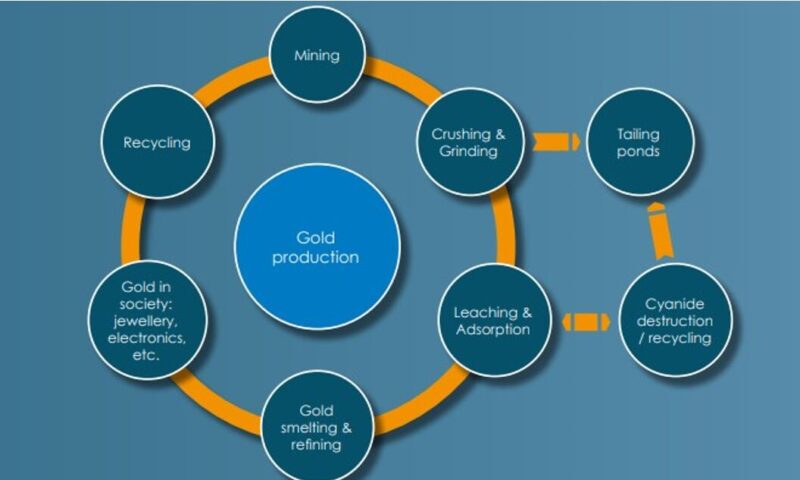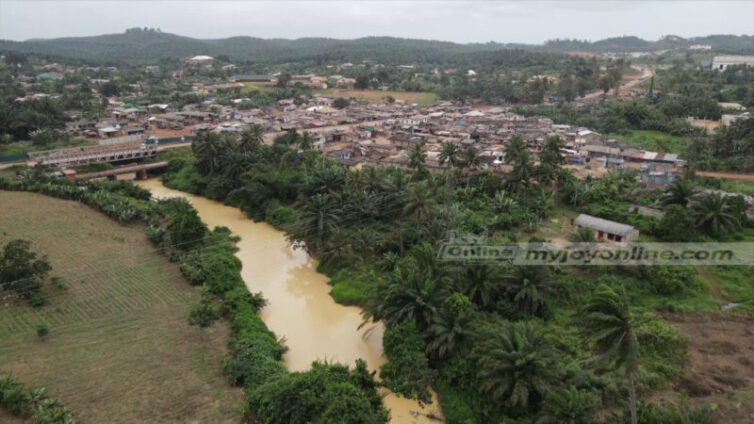Gold’s role in the global economy and protecting the financial security of nations cannot be overemphasized. It is a necessity to hedge declining currencies globally.
Mining is an important economic activity in Ghana, contributing significantly to the country's export earnings, revenues, and employment and about 6% of GDP.
The Minerals Commission Report estimates that artisanal and small-scale mining sector employs about 1,000,000 people.
According to the Ghana Statistical Service, about 2.4% of the labour force has been employed in the mining industry for the past two decades.
However, the substantial rise in the country’s unemployment rate often leads many young people to engage in illegal small-scale gold mining otherwise known as ‘Galamsey’, as a swift and effective method to support themselves financially.
By December 2023, Ghana had produced 135.1T of gold, ranked 6th global gold producer and Africa’s largest gold producer by the World Gold Council. Figure 1.0 shows that China was the world’s leading gold producer (378.2T) followed by Russia (321.8T) by end of 2023.

As gold is projected to hit an all-time high of $3,000 per troy ounce by the end of 2025, ‘Galamsey’ activities have also increased.
By mid-2024, only 36% of Ghana’s gold valued at $1.7billion was from legal small-scale mines. Figures 2.0 and 2.1 show projections of gold pricing by 2025.


Mercury is pre-dominantly used in ‘Galamsey’ together with other pollutants contaminating over 60% of Ghana’s water resources according to the Ghana Water Resources Commission.
In August this year, the Ghana Water Company Limited, Ghana’s main potable water supplier added that, it would be unable to supply Cape Coast (Central Region) and other neighboring communities with adequate drinking water due to the relentless heavy metals pollution of the Pra River.
It recorded an average turbidity of 14,000NTU instead of 2,000NTU which is desired for adequate treatment. Figure 3.0 reveals that an average of 6500kg of mercury is released into water bodies per year.

Organic methylmercury causes impairments in neurological development in foetuses and young children and of damaging the central nervous system of adults.
Statistics from the Ghana Health Service indicate a continual rise in birth mortality rates, stillbirths, and other birth-related complications in regions impacted by illegal mining.
Also, people are most likely to be exposed to harmful quantities of mercury through consumption of fish contaminated with methylmercury.
According to the Responsible Gold Mining Principles, the use of mercury in the extraction of gold in gold processing facilities has been banned as it is in support of the Minamata Convention.
Ghana became a signatory to this in 2014 with ratification in 2017 as it had pre-existing and malfunctioning laws criminalizing its import, possession or buying and selling.
Promoting sustainable and responsible mining practices is by far, the most feasible way to address the impacts of this problem. Government incentives and support can facilitate this transition for those currently engaged in ‘Galamsey’ as standards of practice as by the European Union (EU).
The use of mercury and cyanide in ore processing is regulated by specific requirements enacted by the EU to ensure safe use and to prevent risks for human health and the environment.
According to the Mining Waste Directive and its accompanying Reference Document, the combination of cyanide-based gold recovery with subsequent cyanide destruction is deemed a Best Available Technique (BAT). They require that dilute solutions of mercury/cyanide be used to recover gold from the ore in a closed-loop process as described in Figure 4.0.

Banning mercury/cyanide use in mining at EU level has been widely discussed but largely unjustified due to the global economic decline to result out of it as gold may have to be refined outside of the EU where ideal standards exist.
Additionally, despite significant investments made to find cheaper technologies which could replace cyanide, suitable, efficient and more environmentally friendly alternatives simply do not exist on an industrial scale at this time.
Current efforts which will have to be made include developing a more comprehensive regulatory framework that enhances the capacity of the Minerals Commission and other relevant agencies to effectively monitor and manage small-scale mining.
This includes improving licensing processes, enforcement mechanisms, and inter-agency coordination.
Establishing a system for regular review and adaptation of mining policies based on emerging challenges, stakeholder feedback on mercury use in mining and technological advancements will be essential to forge a resilient approach to responsible and sustainable mining.
This will help to address gaps and enhance responsiveness to illegal mining activities.
Latest Stories
-
Shippers’ Authority blocks arbitrary fee hikes with new regulatory powers
33 minutes -
Cedi to remain broadly stable in coming months; gained 30% against dollar since January 1
60 minutes -
Mahama declares galamsey a national emergency, orders arrest of rogue taskforces
1 hour -
Ghana champions youth skills with national dialogue and launch of TVET Week 2025
1 hour -
Ghana’s inflation to remain on a downward trajectory in second-half 2025 – Fitch Solutions
1 hour -
‘Deal with galamsey, the situation is urgent’ – National House of Chiefs president to Mahama
1 hour -
AG directs EOCO to investigate NDC executives cited in galamsey allegations
2 hours -
Mahama pledges 70% world market cocoa price to farmers
3 hours -
EOCO teams up with Nigerian agency to rescue trafficking victims
3 hours -
State funeral to be held for Joseph Kobina Ade Coker on August 1
3 hours -
Mahama orders arrest of fake anti-galamsey taskforce extorting miners
4 hours -
Joseph Kobina Ade Shino Coker
4 hours -
Royal Sweet Limited signs up for JoySports Invitational Tournament 2025
4 hours -
Ghanaian movie industry wasting talent – Gloria Sarfo
4 hours -
Ho West MP secures 100 international scholarships for constituents
5 hours

